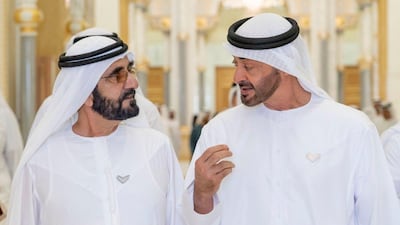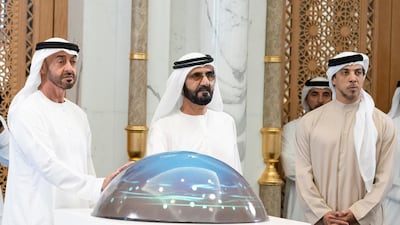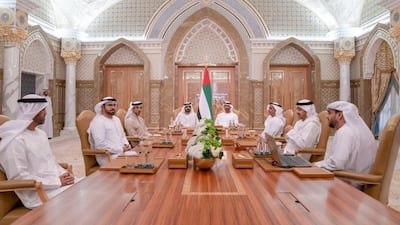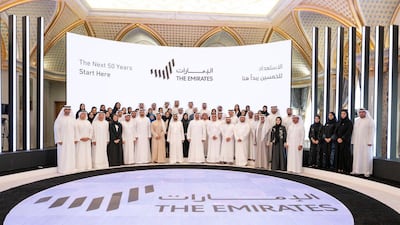More than 10 million people helped to choose the logo that will represent the UAE to the world.
But the hard work in making a success of the country’s first attempt at promoting a nationwide brand overseas has only just begun, experts said.
From Saudi Arabia to Luxembourg and Brazil, countries try to claim a unique identity and project it internationally.
An entire industry sprang up to help countries market themselves to the world, as they compete for investment and tourists and seek to build soft power.
But spending millions does not guarantee success.
"Most country and nation brand strategies fail," said Jose Filipe Torres, partner and chief executive of Bloom Consulting, which helped to develop branding strategies for Australia, Paraguay, Poland, Miami and Madrid and is based in the Spanish capital.
“There are more cases of failure than success because the basis of what their doing is marketing, not branding.”
He advises clients to ensure the image presented is rooted in reality and has a clear central idea. Marketing, he said, came “last but not least” in the list of priorities but would not change perceptions or an emotional response to a country on its own.
He put forward Estonia, a country of 1.3 million people, as an example of a country that developed policies and strategy based on the central idea of the "digital nation" in the 1990s.
Large amounts of positive press coverage meant Estonia was covered as a modern, digital, efficient nation, with its enhanced reputation attracting investment, talented workers and tourists..
“I think the Emirates already has a good brand; it is generally associated with progress and positivity,” Mr Torres said. “A logo is not a brand – a brand is what you think about a country. It is the emotions and feelings that pop into your heart and mind when you say its name.
"It's important that they think strategically. It comes back to the central idea, what is the central idea of the Emirates and why?"
“I would recommend to start with that, build a structure to manage this, and really work on their digital identity.”
Although the term nation or city branding was coined in the late 1990s, examples of it go back much further.
When the "I 'heart' NY" campaign and logo was launched in 1977, New York was on the brink of bankruptcy with a reputation for crime, dirt and rude residents.
Its success is seen as helping the city turn its image around.
That drive inspired the Glasgow's Miles Better campaign, which emerged in the late 1980s to promote Scotland's largest city.
When Edinburgh, the historic capital of the country, banned the campaign's adverts from its city buses, the story attracted worldwide coverage, promoting Glasgow to millions and helping to transform its image from that of a violent, alcohol-fuelled, rainy metropolis ruled by gangs.
Building on the success with the 'Scotland with style,” and 'People make Glasgow' campaigns, it now has a reputation as a friendlier and livelier alternative to its picturesque rival Edinburgh, a 50-minute train journey away.
Elsewhere, a ‘Come Back to Jamaica’ advertising drive in the 1980s was credited with delivering double-digit annual growth to tourist numbers for the Caribbean island.
The “what happens here, stays here” slogan, created for Las Vegas in 2003, has also entered common parlance, with its nod to the hedonism and freedom that can be found in America’s Sin City.
But success is far from guaranteed; some studies suggest nearly nine in every 10 campaigns are unsuccessful.
Even the expert who first used the phrase ‘nation branding’ believes the idea that a country’s perception can be shifted just with advertising campaigns, logos and clever marketing is simply wrong.
"All the evidence shows that if a country wants to be more admired, it needs to become more admirable," Simon Anholt, one of the world's leading experts on national image, told The National.
“Sending out messages saying how wonderful, beautiful, modern, tolerant, powerful, wealthy, creative, peaceful, well-intentioned or distinguished you are as a country is a 100 per cent guaranteed waste of money. It has never worked for any other country in history and it won’t work for the UAE."
Changing the perception of a country internationally is possible, Mr Anholt said, but it requires "enormous amounts of vision, patience and imagination". It need not cost money, but instead required consistently doing the right thing on the international stage.
“The UAE, in particular, is one of the more effective countries on Earth when it comes to innovative and forward-looking policymaking and I have enormous respect for its dynamism and originality,” he said. “It’s lucky enough to have some exceptionally talented people working in its government.
“But the missing element is not shouting about it; it’s innovating more strategically, more consistently, more thoroughly and with a clear long-term global purpose behind it, producing tangible benefits not just for the UAE and its citizens, but for the whole region and the whole of humanity.
“This, and only this, is where a positive national reputation comes from, and of course it doesn’t happen overnight.”
On Wednesday, it was revealed that an online poll had led to a design called 7 Lines had been chosen as the country’s new logo.
It includes seven stripes – depicting each of the nation’s Emirates in the colours of the UAE flag.
Sheikh Mohammed bin Rashid, Vice President and Ruler of Dubai, and Sheikh Mohamed bin Zayed, Crown Prince of Abu Dhabi and Deputy Supreme Commander of the Armed Forces, unveiled the winning entry.
It was announced that more than 10 million trees, almost one for every person who voted, would be planted including in Numfoor Island, one of the most disadvantaged areas of Indonesia.
The new brand project has been set up with the intention of enhancing the country's global reputation and telling the story of the country, Sheikh Mohammed said at the unveiling. While Dubai, Abu Dhabi and Ras Al Khaimah have previously launched separate branding initiatives and tourism campaigns, a UAE-wide drive is a first for the country.
William Shintani, managing partner at MBLM, a brand agency in Dubai, said as helping to promote the country overseas, the campaign could also reap rewards within the UAE.
“Destinations are very complex brands,” said Mr Shintani, who has previously worked on campaigns from Dubai to Latin America.
"There is a lot happening – business, tourism, multiple parties and conversations going on in a multi-faceted ecosystem.
"A brand needs to keep itself alive – the people managing it need to make sure it's relevant and continually assess it because it is almost like a living entity, being fed by everything that is happening inside and outside the country. So you always need to tweak it and be on top of the conversation," he said.
“The nation brand is very ambitious in what it is trying to achieve, but I think the statements from the UAE's rulers have made is very clear, concise and simple to understand.
“It is people who make a country so the unification of hearts and minds, and culture and values of everybody, I think is going to be fantastic thing.”









